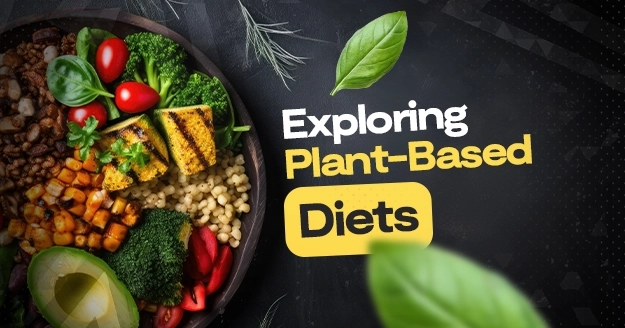In recent times, the trend of following plant-based diets has become popular not just among health-conscious people but also among athletes. Athletes, famous for their intense training routines and dietary needs, are now embracing plant-based diets to improve their performance, speed up recovery, and promote overall well-being. This article explores the world of plant-based diets for athletes, examining the benefits and challenges of this nutritional choice.
What is a whole food plant based diet?
A whole food plant-based diet is a way of eating that prioritizes consuming whole, unprocessed plant foods while limiting or avoiding animal products and highly processed foods. This approach emphasizes eating various fruits, vegetables, whole grains, legumes, nuts, and seeds, which are rich in nutrients, fiber, and antioxidants.
The focus is on consuming these foods in their most natural and minimally processed forms, promoting overall health and well-being while aligning with environmental sustainability principles. This dietary approach can help individuals meet their nutritional needs while supporting a healthy lifestyle.
Benefits of a Plant-Based Diet
Nutrient Density and Performance Boost
When properly planned, a plant food diet can provide athletes with various essential nutrients. Foods like fruits, veggies, nuts, seeds, and whole grains are packed with minerals, vitamins, antioxidants, and phytochemicals that can boost energy levels, aid in recovery, and strengthen the immune system, which is crucial for optimal athletic performance. Athletes can reap the nutritional benefits of choosing plant-based alternatives without relying on animal-based sources.
Inflammation Reduction
Chronic inflammation can negatively impact an athlete’s ability to recover and perform at their best. Many plant-based foods, such as leafy green veggies, berries, and nuts, are known for their anti-inflammatory properties. These foods contain compounds that can help mitigate inflammation, potentially reducing the risk of injury and supporting faster recovery after intense training sessions. By incorporating a plant food diet into their diets, athletes can minimize inflammation and improve their overall athletic performance.
Heart Health and Endurance
A healthy plant-based diet has been associated with better cardiovascular health. Athletes require efficient blood flow and oxygen delivery to maintain endurance. Plant-based foods, particularly those high in omega-3 fatty acids (such as chia seeds, flaxseeds, and walnuts), can contribute to heart health, improving an athlete’s stamina and endurance by enhancing their cardiovascular system’s efficiency.
Weight Management and Body Composition
Maintaining a healthy weight and body composition is essential for athletes. Plant-based diets often have lower levels of saturated fats and calories while being high in fiber. This combination can help athletes achieve and maintain their desired body composition by promoting a healthy balance between muscle mass and body fat. This can benefit athletes in various disciplines and support their overall athletic performance.
Navigating the Challenges
Meeting Energy Requirements
One common worry for athletes switching to a plant-based diet is making sure they get enough energy. Some plant-based foods have fewer calories per serving than animal-based alternatives, so athletes may need more food to meet their energy needs. Athletes must pay close attention to their macronutrient intake, particularly protein and healthy fats, to avoid energy deficits. Careful meal planning ensures they consume enough calories to support their athletic performance.
Protein Sourcing and Timing
Protein is a crucial component of athletic nutrition, as it helps with muscle repair and growth. While plant-based protein sources like beans, lentils, tofu, tempeh, and quinoa are abundant, athletes must be mindful of combining these sources to ensure they get all essential amino acids. Additionally, timing protein intake, particularly around training sessions, is necessary to optimize muscle protein synthesis. This means consuming protein-rich foods or supplements before and after workouts to support muscle recovery and growth.
Vitamin and Mineral Considerations
Some essential nutrients, such as iron, vitamin B12, and omega-3 fatty acids, are more commonly found in animal products. Athletes following a plant-based diet may need to pay extra attention to these nutrients, as deficiencies could impact their performance. Athletes should consume fortified foods or supplements to get enough of these essential micronutrients to address potential deficiencies. This will help them maintain optimal health and athletic performance.
Social and Practical Challenges
Switching to a plant-based lifestyle can present some social and practical challenges for athletes. Eating out at restaurants, participating in team meals, or attending social gatherings may require more planning to ensure they have access to plant-based options. Athletes may encounter limited plant-based choices, requiring them to be flexible and resourceful in meeting their nutritional needs. Athletes can overcome these challenges with careful planning and communication, helping athletes maintain a healthy and balanced plant-based diet.
Plant Based Diet Food List
If you want to follow a whole food plant diet, you can use this list for your next grocery shopping.
Fruits:
- Apples
- Bananas
- Berries (strawberries, blueberries, raspberries, etc.)
- Citrus fruits (oranges, lemons, limes, grapefruits)
- Mangoes
- Pineapples
- Avocados
- Grapes
Vegetables:
- Leafy greens (spinach, kale, Swiss chard, lettuce)
- Cruciferous vegetables (broccoli, cauliflower, Brussels sprouts)
- Root vegetables (carrots, sweet potatoes, beets)
- Bell peppers
- Tomatoes
- Cucumbers
- Zucchini
- Onions
Whole Grains:
- Quinoa
- Brown rice
- Barley
- Oats
- Whole wheat
- Farro
- Bulgur
Legumes:
- Beans (kidney beans, black beans, lentils, chickpeas)
- Peas
- Edamame
- Tofu
- Tempeh
Nuts and Seeds:
- Almonds
- Walnuts
- Chia seeds
- Flaxseeds
- Sunflower seeds
- Pumpkin seeds
Plant-Based Proteins:
- Tofu
- Tempeh
- Lentils
- Chickpeas
- Black beans
- Quinoa
Plant-Based Dairy Alternatives:
- Almond milk
- Soy milk
- Coconut milk
- Cashew milk
- Plant-based yogurt
Healthy Fats:
- Avocado
- Olive oil
- Nuts and seeds
Herbs and Spices:
- Basil
- Cilantro
- Oregano
- Thyme
- Turmeric
- Cumin
Sweeteners:
- Maple syrup
- Agave nectar
- Date syrup








